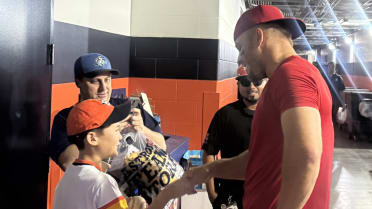PORT ST. LUCIE, Fla. -- David Wright sat, cross-armed in the Mets' dugout, swaddled head to toe in Mets gear. Around him, about two dozen media members strained forward with cellphones and boom mics, asking anything and everything about Wright's path back to the Majors. An update on his status. Goals for his future. Thoughts on retirement.
"I probably have a lot of the same questions that you're asking me, and a lot of people are asking of me, because I just don't know," Wright said at one point during a 21-minute press conference. "I'd love to play again. But my body's got to hold up and it's going to have to cooperate with me a little bit."
• Spring Training:Info | Tickets | Gear
For much of the last decade, but most particularly in the last three years, that body has betrayed him. Since doctors diagnosed Wright with spinal stenosis in 2015, he has undergone neck, shoulder and back surgeries. He has not played in 21 months. He has appeared in just 75 games the past three seasons.
:: Spring Training coverage presented by Camping World ::
Amid that backdrop, Wright offered optimism that he will be able to return to the field, and realism that it might never happen.
More than anything, he expressed a desire to keep trying.
"It would be easy if I didn't have that drive to get back out there," Wright said. "If I didn't love what I did, that would certainly make things easier. But I do love what I do. … When it's all said and done, I want to be able to say I did everything I could. If it works, that's obviously the goal. And if it doesn't work, then I'll rest easy knowing I gave it my best shot.
• Mets notebook: Conforto a welcome sight
"When you're used to doing something your entire life and it's taken away from you, it's definitely frustrating. Every day I'm reminded when I come in, I see everybody else getting their uniforms, going out there and doing the things I love to do, and I'm stuck in the training room doing rehab stuff. Frustration's an understatement."
At age 35, his last full, healthy season now six years behind him, Wright understands that he may ultimately fall short of his goals. That is why he did not complain when the Mets signed Todd Frazier, a fellow third baseman, to a two-year contract this winter. To the contrary, Wright reached out to Frazier to pre-empt any awkwardness, saying Saturday that the Mets are a better team if both of them are healthy.
A day earlier, Wright walked into new manager Mickey Callaway's office to ask how he could help as a leader. Still the captain, Wright attended as many games at Citi Field last year as his rehab schedule allowed, but typically kept himself confined to back rooms.
"Everybody knows who David Wright is and the kind of leader that he is," Callaway said. "I told him … 'I want you as present as possible. I want you to be around the guys.' We need his leadership."
If nothing else, such engagement will help Wright connect to an evolving roster. The toughest part of the past few years, he says, has been feeling absent from the team's successes and failures.
"I've had a hard time with it, certainly," Wright said. "But I guess you do what you can do, and you do everything in your power. The biggest thing is I don't want, when it's all said and done, to say, 'Man, I wish I would have done this,' or, 'I wish I would have done that.' You do it and then it's out of your control. I challenge myself every day to be the best rehab patient that I possibly can be."
For now, that means a continual slog of physical therapy and rehab exercises, though Wright hopes to begin a running program soon. If baseball activities follow, he'll be thrilled. If game action occurs after that, even better.
If none of that happens, then none of that happens. It won't stop him from trying.
"I guess baby steps," Wright said, "are still steps in the right direction."
Anthony DiComo has covered the Mets for MLB.com since 2007. Follow him on Twitter @AnthonyDiComo, Instagram and Facebook.



